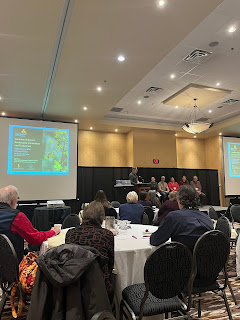Last week beekeepers and industry representatives across the country had the pleasure of attending Bee Tech – a national beekeeping convention and tradeshow presented by the Canadian Honey Council (CHC) and the Canadian Association of Professional Apiculturists (CAPA). This joint meeting between CHC and CAPA was the first of its kind, and during the two-day event there were over 50 speakers and panelists discussing a wide range of topics relevant to the Canadian beekeeping industry.
Review of Bee Tech 2024
Preceding the Bee Tech convention, both CHC and CAPA held their annual
general meetings. These were closed meetings only to be attended by CHC and
CAPA members. As members of CAPA, ATTTA attended their annual general meeting
to learn about the current work being done by the association. During the
meeting the final results of the CAPA honey bee winter loss survey 2022-2023
were discussed in detail. All members of the beekeeping industry are encouraged
to read the results of the survey on the CAPA website.
The official Bee Tech convention kicked off the morning of Friday
February 9th. Attendees heard from Dr. Jeff Pettis (Research Scientist and Consultant, Pettis and Associates LLC) on how climate
change is impacting the beekeeping industry. For example, a study from Chile
shows that weather changes, such as excessive rain, are directly impacting
honey production. Climate impacts on honey production are being seen in Canada
as well. Additionally, higher carbon dioxide levels are impacting pollen
quality. Several studies have been done demonstrating higher carbon dioxide
levels are resulting in a reduction of protein concentration in pollen.
Maggie Gill (DEFRA -UK) gave a very informative session on
Tropilaelaps mites. These mites are from Asia and are more damaging than Varroa
mites by vectoring more viruses, quicker movement, faster reproduction, smaller
and harder to detect, and more aggressive than Varroa. Although not detected in
North America yet, the industry must be vigilant in educating and monitoring
for Tropilaelaps mites. A team of inspectors from United States and Canada are
investigating detection methods for these damaging mites. One of the biggest challenges
the team is facing is that these mites are much smaller than Varroa mites,
which makes them difficult to detect with current monitoring techniques.
The first panel discussion of the conference was on regional beekeeping
issues. Atlantic Canada was represented by Chris Lockhart (New Brunswick
Beekeepers Association president). Chris highlighted that one of the biggest
issues facing Atlantic Canada (especially NB and PEI) is the growing demand for
pollination units. New Brunswick and Prince Edward Island cannot meet their own
pollination needs and must rely on importing bees from other provinces.
Overall, in Atlantic Canada we have a growing need for commercial beekeepers.
Additionally, the Maritimes needs to maintain the efficacy of Varroa
treatments, and the country as a whole needs to help Newfoundland remain Varroa
free.
The next panel discussion was on
domestic bee production. Some of the major issues impacting domestic bee
production include seasonality (late spring and short beekeeping season), long
winters, and labour shortages. Although many Canadian beekeepers want to only
use local stock, one of the biggest issues our industry faces is having queens
early in the season. One possible solution to this problem is overwintering
both nucleus colonies and queen banks.
Dr. Erika Plettner (Simmon Fraser University) gave a presentation on a new
acaracide, which is the compound 1-allyloxy-4-propoxybenzene. She described
some of the current research being done to understand the compound’s mode of
action on phoretic mites. Robert Lu (University of Alberta) also gave a
presentation on a different novel compound to control Varroa mites, which is
3c(3, 6). This novel compound shows high efficacy compared to some other
products. However, there is still a large amount of work to be done before this
product is ready for the market.
Phyllis MacCallum (Senior Program Manager AgriLMI) gave an update on the
labour market for the Canadian apiary sector. The take home message is that the
Canadian apiary sector is experiencing a severe shortage of labour. In 2022,
31% of apiary employers were unable to find the workers they needed. This labour
shortage is expected to grow exponentially over the next few years, with an
expected rise of more than 15% by 2030.
On day two of Bee Tech, there was a
panel discussion on the relationship between the Canadian and United States
beekeeping industries. The panel discussed their opinions on if the border
should be open for importation of packages to Canada from United States. Some
industry representatives are concerned about new pests and diseases that could
come with the importation of packages, and how this may impact the Canadian
beekeeping industry. Some industry representatives think it will be beneficial
to have options when acquiring bees, and that opening the boarder to packages
will help the industry increase honey bee stock. The discussion that occurred
was respectful of all opinions and made those in attendance think critically
about the topic.
Thank you to everyone who participated
and organized Bee Tech 2024. Rod Scarlett, president of the Canadian Honey
Council, did a fantastic job at leading the organization and facilitation of
the conference. The Atlantic Tech Transfer Team for Apiculture was please to
attend Bee Tech and looks forward to similar events in the near future.

